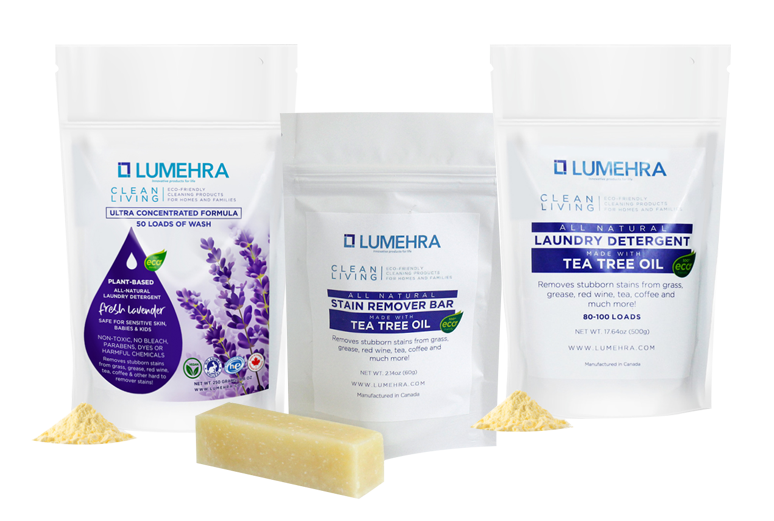Laundry detergents made their way in the first half of the 20th century but they have become an essential part of our everyday washing. According to stats, an average American family engages in 8 to 10 loads of laundry per week. However, environmental enthusiasts have shown concerns about the harmful impact of laundry detergents. Many countries want to put a ban on phosphate that is commonly used in detergents. There are detergents that are free from phosphate, but they have other concerns regarding the use of chemicals.
Before you decide which laundry detergent is eco-friendly, you need to understand how detergents work. Only then you will be able to select the one that is free from the harmful skin and environmental effects.
How do laundry detergents work?
Bio and non-bio are common terms used for laundry detergents. Biological detergents have enzymes for breaking down grease, fat, and proteins in order to clean clothes. Whereas non-bio detergents consist of different chemicals for cleaning. Both the bio and non-bio connect oil with water molecules to get rid of dirt from the clothes. This also helps in draining the dirty water.
Enzymes in the bio-detergents break away dirt and oil on clothes. This helps to remove them from fabric at low temperatures. High temperatures break enzymes before they work against oils and dirt. The chemicals in non-bio detergents break up dirt and mix it with water, which is drained later on.
However, the enzymes in the bio-detergents are harmful for materials such as silk and wool. They not only cause eczema but also skin irritation. Non-bio detergents are better for sensitive skin but they have non-biodegradable agents that are harmful for the environment.
Are plant-based detergents better?
Plant-based detergents are eco-friendly and are mostly referred to as green detergents. That’s because most of the chemicals used in these detergents are derived from plants. On the other hand, non-plant-based detergents come under the category of conventional detergents and contain synthetic surfactants – mostly composed of petroleum.
According to research done by Seventh Generation, if every American family replaces a bottle of petroleum-based detergent with that of plant-based detergents, you will end up with 149,000 barrels of oil. This oil can then be used for heating and cooling about 8000 homes for a year.
The surfactants, especially phosphate used in the traditional detergents, also pollute water and harm marine life.
So what is the most effective way?
The laundry detergent effectiveness is based on your lifestyle. Although non-bio laundry detergents are good for sensitive skin, they are harmful to the environment. On the other hand, bio laundry detergents work well in low temperatures and can help in saving money but are injurious to skin health. This means that if you are suffering from sensitive skin, eczema, or have young children at home, it is better to use non-bio detergents for washing your laundry.
Are plant-based detergents better for the environment?
Plant-based detergents come under the category of non-bio detergents. But unlike the other non-bio detergents that use surfactants, plant-based detergents are good for both health and the environment. The only downside is that they are a bit expensive. However, since these detergents are concentrated, you wouldn’t need to put a lot of it in for washing. You can also run these eco-detergents at a low temperature.
Another good thing about these green-detergents is that they are not tested on animals, are free from phosphate, recyclable, and biodegradable!
Which laundry detergent is eco-friendly and good for the atmosphere?
As shared above, traditional detergents are full of harmful chemicals that negatively affect both the health and environment negatively. This is particularly true for phosphates which are present in some non-bio detergents.
Phosphate is actually a type of salt that is commonly used in fertilizer. It pollutes water and causes algae growth. The algae then reduce oxygen from water which disturbs the natural balance of the ecosystem. This is a reason why most environmental enthusiasts want to put a ban on the use of phosphate in detergents. To get around this ban issue, some agencies have started using other chemicals that are harmful to humans instead of the environment. Phosphate is also present in a dishwashing detergent.
The surfactants present in non-bio laundry detergents are harmful for fish. These surfactants harms fish gills which disturb the entire marine life food chain. Even low levels of such chemicals negatively affects aquatic life by aiding algae and other such materials to grow and develop inside water.
A report was conducted on the major use of surfactants. This report declared that there is no major-impact of these surfactants on marine life at our current level of use. However, they warned that if the usage increases, then the situation can also change.
Green or plant-based detergents on the other hand are free from chemicals that can prove to be pollutants. They are 100% green to use and drain into waterways. Also, they are biodegradable as they have major ingredients derived from plants. The only downside is the cost, which is a bit high.
Conventional detergents use ingredients which are carcinogenic. The 1,4 dioxide mostly found in cosmetics is also considered “carcinogenic to humans,” as it is already proved to be carcinogenic to animals.
Why should you opt for a plant-based laundry detergent?
Considering the health and environmental friendly effects of plant-based detergents, you should definitely opt for them. Some other advantages include:
● Save money over time thanks to the concentrated effect
● Available to run at low temperatures thus saving energy
● Reduce the use of petroleum which is good for the environment
● Better for skin and environment issues
● Healthy for aquatic life as it does not pollute water.
Making your laundry Eco-Friendly
There are steps that can be taken for turning the everyday laundry into an eco-friendly activity. Although different options are available in the market, it is entirely up to you what you want to choose depending on your budget and living.
There are reusable laundry devices such as EcoEgg that can be used in place of laundry detergents. They are not just good at washing clothes but also don’t harm the environment.
If you want to stick to natural stain removers, try the ones that don’t include chemicals such as chlorine. Bleach is also a big no as it releases toxic elements into the air during the manufacturing process. You can always try Lumehra’ tea tree oil laundry detergent for cleaning clothes.
Use an eco-friendly energy-efficient washing machine. It will help you decrease your electricity bill and also reduce the water consumption. You can also wash clothes once or twice a week to avoid water and detergent wastage. If your clothes are only worn for a few hours, look and smell fine then you can wash them later.
Instead of depending entirely on a washing machine spinner, use a clothesline. You can also use dryer balls to decrease the energy use.
You can also buy clothes made of natural fabrics such as bamboo, wool, or organic cotton instead of synthetic materials to prevent the release of microplastic during wash. They are sustainable and help reduce microplastic pollution.




I am looking for a laundry product that will allow rinse water to safely drain onto my trees and plants
hi Kristi,
thank you for your question. All our detergents and stain remover bar are biodegradable and non-toxic. we do not use any sulphates, phosphates, parabens, bleach or dyes. Our products are products are 100% eco-friendly.
Thank you
lumehra team
Were I can get at India thank u
Hello Arun
thank you for your questions, currently, we are only shipping within Canada and the US.
Regards,
lumehra team
Hi can get madras tamil nadu India … Or any place in india pls mail me at bahufanabapana@gmail.com ….. Thank u